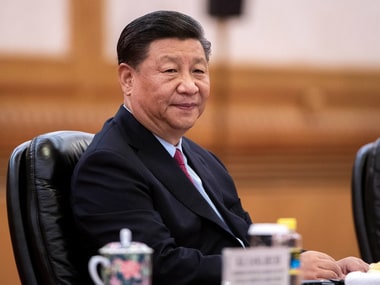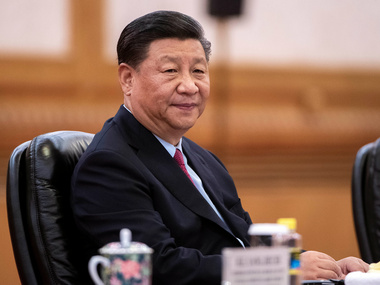Almost five months after reporting the coronavirus outbreak and battling two waves of rising cases, China reported just two confirmed cases on Wednesday. Apart from a delayed response and acknowledgement of the crisis, China has also been blamed for silencing critics, which include medical workers, journalists and even citizens. The virus spread to various countries, having infected 37,43,654 people and claimed 2,58,850 lives so far. On the outset of the outbreak in December itself, officials questioned eight people who had posted on social media about the virus in December, accusing them of spreading rumours. [caption id=“attachment_7182141” align=“alignleft” width=“380”]  File image of Chinese president XI Jinping. Reuters[/caption] Medical workers silenced Prominent expert on respiratory diseases Wang Guangfa told a local television channel in January that the virus was under control and was just causing a “mild condition”. In contrast, Li Wenliang, the whistleblower doctor who warned on 30 December last year about the coronavirus and later contracted and succumbed to it, was made to sign a letter admitting that he was “spreading rumors” and “making false comments” on 3 January. In December, Li had shared a diagnostics report that identified a new illness which looked much like severe acute respiratory syndrome (SARS) with his colleagues on messaging platform WeChat. Days before his death on 7 February, he told New York Times that more “openness and transparency” was needed in China. After backlash over his death, China posthumously awarded him the highest official honour of a martyr. Just like Li, the 2003 SARS outbreak too had seen the government springing into action only after military doctor Jiang Yanyong laid stress on the seriousness of the outbreak. He was put under periodic house arrest and forbidden to visit the United States to collect a human rights award. Rose Luqiu, who had covered the 2003 outbreak for Hong Kong-based Phoenix Television, told New York Times about the muzzling of the news media then and now. She had followed the Beijing mayor for a week to report the government’s response then. The freedom to question governments has diminished now, with her article in January detailing the steps taken by Hong Kong to deal with the virus being deleted 10 hours within being published. In the absence of a muted health fraternity, people of Wuhan, also the epicenter of the outbreak, travelled during the Lunar New Year season, when an estimated three billion trips are recorded. Soon after, the virus spread from Wuhan to Beijing, with the capital city reporting five cases on 20 January. Authorities’ censorship glare on media With the aim to ensure that positive news about China’s fight against the virus reaches the people, the authorities also began a clampdown on reportage by journalists and citizen journalists. A group of Hong Kong journalists were detained for a few hours when they visited a Wuhan hospital and the police asked them to delete their camera footage and hand over their phones for inspection. Prominent political commentators Guo Quan and Xu Zhiyong were detained in February, while Xu Zhangrun was put under house arrest. On 12 March, political commentator Ren Zhiqiang had disappeared after criticizing the regime’s failings. The latest issue of the magazine Ren Wu, a sister publication of People’s Daily, was pulled from news stands on 10 March for carrying an interview in which the head of the emergency department at Wuhan Central Hospital criticized the censorship imposed on doctors, according to Reporters Without Borders. Additionally, a popular opinion blog Dajia was removed from the internet last month after it published a commentary by a renowned journalist calling for greater press freedom in China, reported New York Times. The works of citizen journalists Chen Quishi and Fang Bin laid bare the crumbling health infrastructure in Wuhan, inviting the government’s ire. In his last video broadcast live on 4 February, Chen interviewed a Wuhan resident whose father had succumbed to the coronavirus. His Weibo account was deleted two days later. On 7 February, his parents were told that he was “in quarantine”. Fang, a businessman-turned-reporter, had posted a video from a Wuhan hospital on 1 February, where he was seen counting the bodies of those who had succumbed to the coronavirus inside a minibus. He later posted on 2 February that his laptop was confiscated and he was interrogated. Fang told the Los Angeles Times in an interview that the police officers accused him of receiving foreign funding and told him to stop “posting rumors”. After many days of reporting mounting harassment by the police, he posted a video showing a paper bearing the message, “Let all citizens resist”. Both Chen and Fang are missing since then. China also announced last month that it would expel at least 13 American journalists working in the country for the New York Times, Wall Street Journal and Washington Post. In fact, the government deployed 300 reporters to Wuhan to tell positive stories about the Communist Party’s fight against the virus. Activists, businessmen, citizens not spared Fearing the impact of dissenting voices which criticize the State, China also began a crackdown on citizens not belonging to the health and news fraternities. Ren Zhiqiang, a property tycoon in Beijing, went missing last month after he wrote an essay criticizing the Xi-Jinping led government’s attempts to silence whistleblowers and concealing the outbreak. He also called the Chinese premier a “ power hungry clown”. “I see not an emperor standing there exhibiting his ‘new clothes,’ but a clown who stripped naked and insisted on continuing to be an emperor,” he wrote. Joshua Left, an entrepreneur in Wuhan, posted messages on his WeChat account in mid-January sharing information about the family that his family might not have access to, according to a report by Vice News. Soon, he received a warning message from WeChat administrators. Then he began receiving messages that appeared to come from four of his friends on WeChat, all asking him for his location and his US phone number. Later, all these accounts urged him to return to China as soon as possible. On 20 January, Dongguan resident Jiang Ming responded to a tweet criticizing the government’s response to the outbreak. Days later, agents stood at his door, presenting to him a screenshot of his tweet, telling him that “the content attacks the Communist Party of China.” Ming was detained and interrogated. Ming had his cell phone confiscated for evidence collection but he had a second phone which he used to secretly take pictures of the “promise note” he was forced to sign saying he would not repeat the “threat” he had made. Seven affected residents of Wuhan, who had either lost family members to COVID-19 or had suffered from it sought legal help to sue the government. But New York-based Yang Zhanqing, assisting them in the matter, told Daily Mail that at least two of these residents had to drop their plans after authorities had harassed and threatened them. A civil servant was also interrogated after he filed the country’s first lawsuit on 13 April against the provincial government of Hubei for ‘causing unprecedented losses’ to its people’s lives and properties. The petition also accused officials of organising a vast banquet ahead of the Lunar New Year, knowingly putting more than 40,000 attending families at risks of being infected. China, however, adopted measures to mold the narrative around the country’s response to the coronavirus outbreak. By early February, the government issued guidelines naming 10 categories of new criminal charges to brought against people deemed jeopardizing disease control, undermining social stability by spreading fear about the disease, and criticizing the Communist Party’s handling of the novel coronavirus, South China Morning Post reported. A week later, the health commission of Xiantao, a city of around 1.6 million people, published directives to health workers and government officials that outlawed giving interviews without permission, mentioning the outbreak in group chats to retweeting anything other than the official line, Vice News reported. By March, a law came into effect criminalizing posting content on the internet that criticizes the government. Moreover, Chinese diplomats used to Twitter to give momentum to the conspiracy theory that the virus was allegedly implanted by United States personnel during the October 2019 Military Olympics in Wuhan. With inputs from agencies
Apart from a delayed response and acknowledgement of the crisis, China has also been blamed for silencing critics, which include medical workers, journalists and even citizens
Advertisement
End of Article


)

)
)
)
)
)
)
)
)



